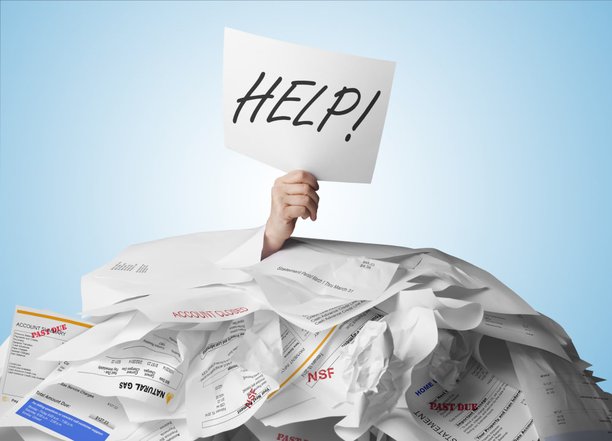How to Fight Credit Card Debt
A credit card is a useful tool for paying for an expense upfront and giving you some time (usually 30 days) to repay it to the bank with no interest charged. However, once a borrower goes beyond the time period allotted, the amount they owe starts accumulating interest – often at steep rates of up to 23%. This is called credit card debt. Left unchecked, credit card debt can lead to several adverse financial consequences.
Luckily, there are several ways to manage credit card debt effectively and responsibly that we will discuss through this article. We will also cover some steps that borrowers can take to ensure that they do not fall into credit card debt in the first place.

What are the consequences of unpaid credit card debt?
Right off the bat, unpaid credit card debt has an adverse impact on your credit score. Lenders will report any instances of unpaid debt (with the principal amount) to a credit agency (such as Equifax and TransUnion). This record then negatively impacts credit history, which subsequently reduces credit score. A reduced credit score and spotty credit history can then make it difficult to obtain further credit as lenders are typically hesitant to lend to borrowers with a history of unpaid debt.
Thereafter, if the debt continues to remain unpaid, creditors will first attempt to collect on their own through specialist collection agencies before going to court. Court processes are expensive and unpleasant for all parties involved, so the first recourse is always to try to recover the money from the individual. If that fails, then the lender has a specified period of time called the ‘statute of limitations on debt’ wherein they can bring a financial-related offence to the court to help settle the matter. This statute of limitations varies in range by province from 2 years in Newfoundland and Labrador, British Columbia, and Saskatchewan to up to 10 years in Alberta.
It is worth noting that there is no statute of limitations for how long the lender can pursue a borrower outside of court for the funds.
What are my options for credit card debt?
If you find yourself facing credit card debt, there are a few routes that you can choose to pay down this debt without it impacting your credit history substantially. While a reduction in credit scores is seldom avoidable, a non-meaningful reduction can be managed and does not throw your financial journey too far off track.
Work out a good repayment strategy
If you have debts on multiple credit cards, compile all of them to see the total principal amount you owe. After that, use a credit card debt calculator such as the one found on Intuit Credit Karma to calculate how much you need to pay back per month (or how long a full repayment will take based on what you can afford per month) in order to become debt-free. Once you have this amount in mind, be disciplined in sticking to it and over time, as you pay back the debt on time, your credit score will start to rise again.Debt consolidation
Another option is to use a debt consolidation loan. By definition, this involves using a single large personal loan to combine and pay off all of your existing credit card debts which likely accrue interest at higher rates. The advantages of using a debt consolidation loan include lower interest charges as personal loans usually charge lower rates than credit cards, as well as less administrative effort required on the part of the borrower to remember to pay off each credit card every month.Talk to your creditors
Another option for borrowers is to reach out to the credit card lenders to explain the situation and see if you can renegotiate payment terms with them directly. The lenders may also offer special hardship programs if borrowers have generally completed timely repayments in the past, and their current circumstances have been influenced by an event, such as unemployment, rather than irresponsible debt management.
Negotiations and Settlement Plans: What are your options?
If you have explored all of the above options and still find yourself facing financial challenges with regards to credit card debt, you still have a few options left.
Debt management plans
There are specialist credit counseling agencies operating on a not-for-profit basis that help borrowers negotiate new terms with creditors based on their specific circumstances and constraints. They also help in consolidating existing debt to minimize monthly interest expenses and manual administrative effort. These counselling agencies charge a fixed rate each month until they help the borrower’s credit card debt come back under control. During this time, the borrower’s credit accounts may be frozen, and new accounts will most likely not be allowed to be opened.Debt settlement
Debt settlements are a form of negotiation with creditors where they are offered a single lump sum of money to eliminate and forgive all existing debt. While this may sound like a good idea for borrowers, it is not always an available option. Creditors are not obligated to negotiate a debt settlement, and if the borrower uses a debt settlement company, they may be obliged to pay the borrower a fixed fee regardless of whether the creditors agree to a debt settlement or not.
Most borrowers looking to pursue a debt settlement will use a specialist debt settlement company. Note that these companies are not non-profit, unlike the credit counseling agencies mentioned above. These businesses operate with a commercial objective and make money through the fees they charge to clients. Once the borrower engages the debt settlement company, they may ask the borrower to sign a power of attorney that enables the company to communicate with creditors on behalf of the borrower.
A helpful tip is to ensure that the debt settlement company informs you of any payments they will make to creditors while holding power of attorney. This will help you verify that your payments are being received and used to pay down your debt.
How to negotiate credit card debt settlements yourself
If you do not want to use a debt settlement agency, you can negotiate your own debt settlement with creditors independently. If you do choose this path, here are some things to keep in mind:
Understand your limits: Create a budget and determine how much you can realistically gather to pay off an existing debt. Remember that once a settlement amount is reached, you are obligated to pay that amount, so make sure you only agree on what you can afford.
Have a clear narrative: While you can avoid personal details that you may not want to share with a wider audience, having a logical story for how you landed into financial hardships will help you make a better case for why the debt settlement would be helpful to you.
When in doubt, ask: There may be terminologies or concepts that you are not familiar with over the course of your conversation with the creditor. However, don’t breeze past this assuming that you will Google it later. It is important to know exactly what you are getting yourself into right at the time of the negotiation.
Document EVERYTHING: Once you have hung up the phone, ensure that you have a written agreement of everything that was decided. This contract will then govern your future transactions and interactions with the creditor.
Leave the conversation if needed: While a debt settlement can be highly advantageous under certain circumstances, if the creditor is not willing to provide you the terms that you are comfortable with, it is okay to thank them for their time and pass on their offer to explore other debt settlement options. In addition, they also have no right to issue threats or be rude. To prevent such instances, ensure that you know your rights beforehand.
Final Thoughts
Credit card debt can be a significant handicap in your financial journey if not managed properly. However, there are multiple options available to borrowers to support repayment and mitigate financial impacts. Before entering into any of these though, it is important to do your due diligence on lenders to ensure that they are trusted and well-reviewed.
While escaping credit card debt can seem challenging, a lender that has your best interests at heart is a great partner to help you accelerate the process. Chat with our team at magicalcredit.ca today to find out how we can support your journey!





